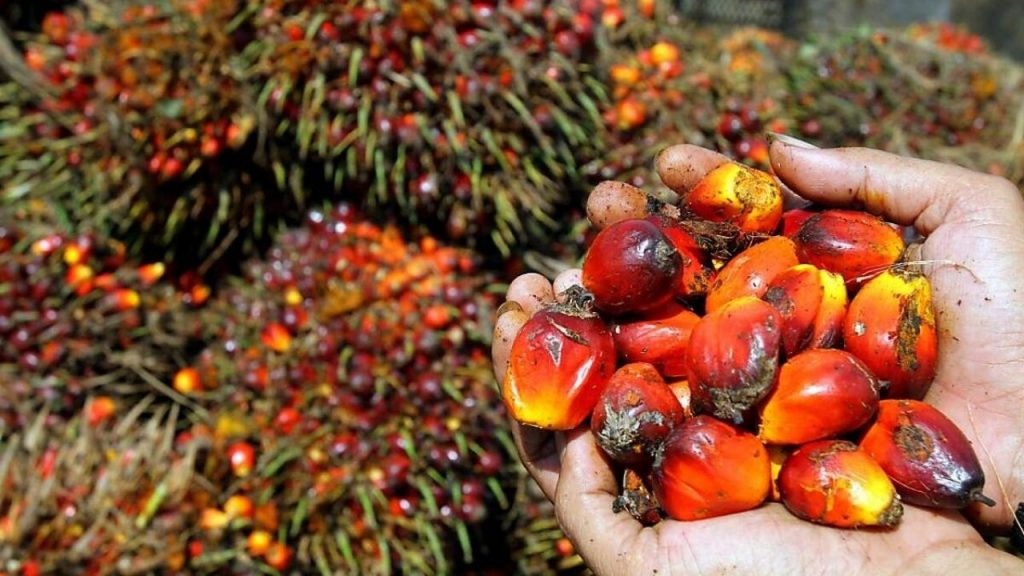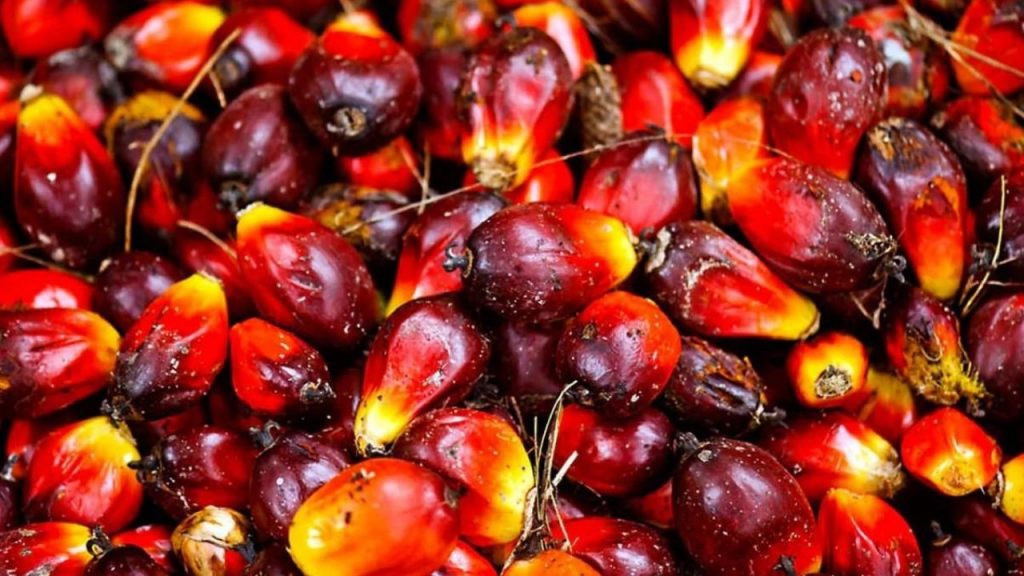
What is palm oil
Palm oil is a vegetable oil derived from the fruit of the palm tree. It is used in many products because it is a saturated fat that is low in calories and has a high smoke point, meaning it can be used to cook at high temperatures.
Palm oil has been linked to environmental problems such as deforestation and climate change, but it is also a major source of income for people in developing countries.

Red palm oil is a great oil for frying. palm oil has a high smoking point of 235 degrees celsius. This means that it can withstand high temperatures without burning or producing harmful compounds.
Other oils, like vegetable oil, have a lower smoking point and can produce harmful compounds when used for frying. Palm oil is also a good source of antioxidants, which can help protect against the harmful effects of oxidation.
The history of palm oil can be traced back centuries. The oil is derived from the fruit of the oil palm tree, which is native to Africa. Today, palm oil can be found in a lot of food products and it has a variety of uses.
What is palm oil used for
Palm oil is a vegetable oil that is derived from the fruit of the oil palm tree. It is used in many different products, both commercially and domestically. Here are ten uses of palm oil:
1) Cooking: Palm oil is a popular cooking oil because it is stable at high temperatures and has a neutral flavor, its texture gives food a rich look.
2) Biodiesel: Palm oil can be used to produce biodiesel, a renewable fuel source.
3) Soap: Palm oil is often used in soap because it produces a rich, creamy lather.
4) Margarine: Palm oil is used to make margarine, a spreadable butter substitute.
5) Lubricant: Palm oil can be used as a lubricant for machines and equipment.
6) It’s also sometimes used as a fuel source, and can even be added to animal feed to improve their health.
7) In addition to all of these practical applications, palm oil also has some surprising benefits for the environment. For example, it can help to prevent deforestation and boost local economies in developing countries.

Important Of Palm Oil
Palm oil is one of the most popular vegetable oils in the world. It is extracted from the fruit of the oil palm tree. Palm oil is a very essential food ingredient that every mum supposed to have in her kitchen because of its benefits.
Anyways, some people believe that palm oil is unhealthy, but that is not true. Palm oil is a source of healthful nutrients, including vitamin E, beta-carotene, and other antioxidants.
Palm oil has many benefits for the skin and hair. It helps to protect against sun damage, wrinkles, and signs of aging. Palm oil also helps to moisturize and nourish the skin and hair.
Palm oil is a type of vegetable oil that is derived from the fruit of the oil palm tree. It is reddish in color and has a characteristic taste and smell that is often described as nutty, earthy, or like pop corn Palm oil is used in a wide variety of foods and beverages, both commercially and domestically. It is also used as an ingredient in many cosmetic products.
Which country is the largest producer of palm oil?
The world’s largest producer of palm oil is Indonesia. They produce around 35 million metric tons of palm oil each year. This is more than twice the amount produced by their closest competitor, Malaysia, who produces around 15 million metric tons of palm oil per year.

Which state in Nigeria is the largest producer of palm oil?
Nigeria is the world’s largest producer of palm oil. The country has a production capacity of about 4 million metric tons per year. The state of Cross River is the largest producer of palm oil in Nigeria, with a production capacity of about 1.2 million metric tons per year. Other states that produce large quantities of palm oil include Akwa Ibom, Bayelsa, Edo, and Ondo.
Is Palm Oil Harmful To Health?
Is palm oil harmful to health? There is a lot of debate on this topic. Some people say that palm oil is harmful because it is high in saturated fat. Others say that it is not harmful and is a healthy cooking oil.
Palm oil is a vegetable oil that is derived from the fruit of the palm tree. It is a popular cooking oil because it has a mild flavor and a high smoke point. It is also high in saturated fat. A recent study found that palm oil may be harmful to health because it increases the risk of heart disease.

Nutrient Composition Of Palm OIl
The nutrient composition of a tablespoon which is 14grams of palm oil is;
- Vitamin E
- Carotenoid
- 7g of Saturated fat
- 5g of unsaturated fat
- Sterols
- 1.5g of polyunsaturated fat
- 114g of Calories
What Are The Disadvantages Of Palm Oil?
Palm oil is a type of vegetable oil that is extracted from the fruit of the palm tree. It is commonly used in cooking and is also found in many processed foods. Although palm oil has some benefits, there are also some disadvantages to using it.
One disadvantage of palm oil is that it is high in saturated fat. Saturated fat can increase your risk of heart disease and other health problems. Palm oil is also high in cholesterol, which can damage your arteries and increase your risk of heart disease.
Another disadvantage of palm oil is that it is a major contributor to deforestation. Palm trees are grown on plantations, and the land used for these plantations comes at the expense of rainforest land. Deforestation contributes to climate change and habitat loss.
Nigerian Recipes That Uses Palm Oil
Palm oil is a type of vegetable oil extracted from the fruit of palm trees. It is one of the most widely used cooking oils in Nigeria and has a host of health benefits. Here are 10 recipes that use palm oil:
- Nigerian red oil jollof rice: Jollof rice is a popular Nigerian dish made with rice, tomatoes, peppers, and onions. Palm oil is used to give the dish its characteristic orange color and flavor.
- Egusi soup: Egusi soup is a popular Nigerian soup made with ground melon seeds, palm oil, vegetables, and meat or fish.
- Efo riro: Efo riro is a traditional dish from the Yoruba people of Nigeria. It is made with spinach. Efo riro is usually served with pounded yam, which is a popular side dish in Nigeria.
- Okra Soup: Okra Soup is a simple and delicious soup made with okra, vegetable, pepper, seasoning cubes,meat, fish, onion, etc. It can be made with or without meat, making it a perfect meal for any time of day.
- Banga soup: Banga stew is a popular West African dish made with fish, palm fruit.
- Beans and potato: Beans and potatoes are a classic combination. Beans are a great source of protein, and potatoes are a great source of carbohydrates.

Is Palm Oil The Same As Palm Kernel Oil?
Palm oil and palm kernel oil are two different oils that come from different parts of the palm fruit. Palm oil is extracted from the flesh of the fruit, while palm kernel oil is extracted from the pit or kernel of the fruit.
Palm kernel oil is higher in saturated fats than palm oil. It is also a more concentrated source of vitamin E than palm oil.
It has a higher melting point than palm oil, so it is solid at room temperature. This makes it a good choice for cooking foods that require a high-heat cooking method, such as frying.
Palm kernel oil is also used in cosmetics and personal care products because it has a long shelf life and does not go rancid easily.
Types Of Palm Oil
Palm oil is a type of vegetable oil that is extracted from the fruit of the palm tree. It is a common cooking oil that is used in many countries. There are many different types of palm oil, and each type has its own unique properties.
The most common type of palm oil is
Red palm oil: This type is high in beta-carotene, and it has a rich orange color. Red palm oil is a good source of vitamin A and other antioxidants. It is also high in saturated fat, so it should be used sparingly.
Another type of palm oil is called
Fractionated palm oil (White palm oil): This type is made by separating the liquid from the solid fat. The liquid portion is then refined and bleached to remove any impurities.
Is palm oil bad for you
Palm oil has recently become a controversial topic due to its widespread use in many processed and packaged foods.
The question on everyone’s mind is, “Is palm oil bad for you?” The answer is not as straightforward as one might think.
While some studies suggest that the high levels of saturated fats found in palm oil can contribute to heart disease, others argue that it can be a healthier alternative to other oils.
One of the main reasons why palm oil is seen as unhealthy is its high content of saturated fats. Saturated fats can increase cholesterol levels and contribute to heart disease, which has caused concern among health experts.
However, recent research suggests that not all saturated fats are created equal and that the type found in palm oil may have different effects on our health than those found in animal products.
Despite concerns about its potential negative impact on health, palm oil also has some benefits.
Conclusion
In conclusion, palm oil is a versatile and beneficial product that can be used in a variety of ways. It is important to be aware of the many benefits of palm oil so that you can make the best choices for your health and the environment.

Leave a Reply
You must be logged in to post a comment.